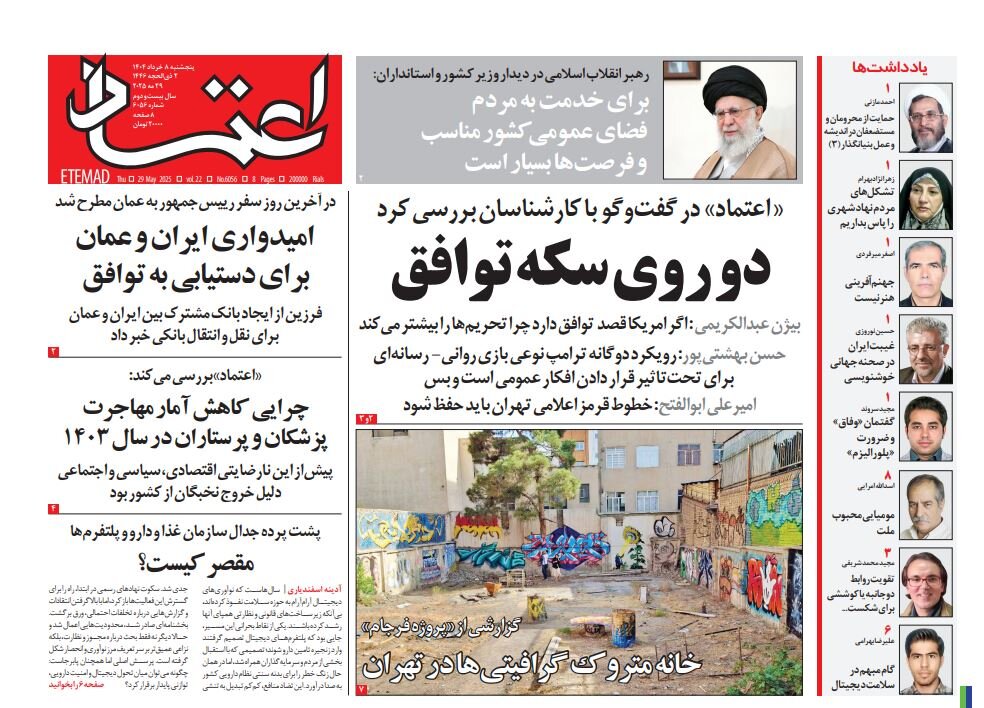National cohesion is an essential factor in negotiations

TEHRAN - Etemad examined the Iran-U.S. negotiations in an interview with Bijan Abdolkarimi, a philosophy scholar.
He said: "The agreement is like a coin, one side of which is an external agreement with the West and the other side is an internal agreement with the people, media, and elites." According to analysts, excessive attention to the issue of agreement abroad should not lead the political system to neglect the importance of achieving interaction, reconciliation, and internal agreement. Initially, the Iranian government adopted a sound policy and diplomacy with the U.S. because the West and the U.S. aimed to create the impression that Iran was unwilling to negotiate; in reality, by accepting indirect bilateral negotiations with the U.S., Iran disarmed the West and Trump. They hoped that Iran would declare its unwillingness to negotiate, which would allow them to prepare for an attack on Iran. However, the country's diplomatic system negotiated intelligently. The Iranian government, like the people, must recognize that our challenge with America will not end soon and is long-term. In the long run, we cannot succeed without the support of the people. To gain that support, we need national cohesion. Additionally, the government must understand the necessity of unity with genuine and national forces.
Iran: Strategic partnership between Tehran and Moscow
In a note, the Iran newspaper discussed the strategic partnership between Tehran and Moscow by quoting Mahmoud Shouri, an expert on Russia affairs, who said: The strategic agreement between Iran and Russia is like a constitution that shapes the relations between the two countries and, more importantly, defines the prospects of these relations. Given the current conditions, including U.S. sanctions, international issues, and the alignment between the two countries at the global level, Iran and Russia must take a more serious look at cooperation with each other. The next step is to guard this treaty and take measures that can strengthen the relations between the two countries. What is certain is that Iran and Russia have gradually reached a point in their relations where they are trying not to allow external factors to have a serious impact on their relationship. What is important is that such agreements are supposed to create a platform so that activists interested in expanding cooperation do not face legal obstacles or at least know the limits and boundaries of cooperation based on these agreements.
Farhikhtegan: A trip full of opportunities
Farhikhtegan commented on Pezeshkian's trip to Oman and wrote: This trip is of special importance in relations between Iran and Oman. Some may think that Oman, as a Persian Gulf country, is important to Iran only in terms of its role as a mediator in the nuclear negotiations, but this country has a unique position in Tehran's foreign policy not only because of its role as a mediator in Iran's international negotiations but also because of its growing economic and cultural relations with Iran. The trip, which was accompanied by the signing of 14 cooperation documents, high-level meetings, and the holding of a business conference, demonstrates the two countries' determination to expand relations in all political, economic, and cultural fields. Oman, as a reliable political mediator, a growing trading partner, and a new destination for Iranian immigrants, has a special place in Iran's foreign policy. Unlike some countries in the region that have had tense relations with Iran, Oman has always adopted a balanced and friendly approach towards Tehran. These relations are based on mutual respect, regional cooperation, and avoidance of interference in each other's internal affairs.
Jam-e-Jam: Retreating in the face of Iranian power
In an article, Jam-e-Jam pointed to London's retreat after Tehran responded authoritatively to Britain’s call for zero enrichment in Iran. Foreign Minister Abbas Araghchi delivered a stark warning to the United Kingdom on Tuesday, stating that London's apparent insistence on "zero enrichment" in Iran renders further dialogue on the nuclear issue futile. The paper wrote: Amid the diplomatic nuclear struggle, the West sought to put new pressure on Iran, which faced Iran’s strong response, with Tehran insisting on its national and legal rights. The pressure started with a threat to trigger the snapback mechanism (that would return the UN sanctions on Iran) and impose zero enrichment on Iran. Since Iran considers these two things as crossing its red lines, the British side was forced to back down. What this diplomatic dispute has made clear is quite important: the language of threats and media pressure cannot dissuade the Islamic Republic of Iran from pursuing its legal rights. By relying on legal logic, resistance diplomacy, and domestic support for the nuclear industry, Tehran has been able to consolidate its positions and force Europe to back down from its unilateral claims. London's retreat is not just a tactical retreat, but a sign of the deeper reality that Iran today is not just a negotiating country, but a powerful and decisive player in the regional and international security and diplomatic equations.
Leave a Comment